Kyiv chief rabbi: 'Putin has united Ukrainians and Jews'
DW speaks to Rabbi Moshe Reuven Azman, one of Ukraine's leading clerics, who recently made a passionate plea to Russians to stand up against the Kremlin and protest the current war in Ukraine.

Moshe Reuven Azman
Rabbi Moshe Reuven Azman is the chief rabbi of the Brodsky Synagogue in Kyiv. He recently made an impassioned video address in which he accused Russian President Vladimir Putin of committing war crimes and crimes against humanity. He called on Russians and Jews to protest and help bring an end to the war in Ukraine. DW spoke to him about his motivation and the reactions to his plea, and for his assessment of events.
DW: The Kremlin says that "denazification" is one of the goals of its military operation in Ukraine. What is your response?
Moshe Reuven Azman: Against whom is this "denazification" directed? Against President [Volodymyr] Zelenskyy, who is Jewish? Or against opposition leader [Vadim] Rabinovich? Only somebody who has been brainwashed by television, which spreads all sorts of nonsense, could believe such rubbish. There is no Nazism in Ukraine; there aren't even any nationalist parties in parliament. No normal person believes this drivel. Moscow just needs a pretext to satisfy its imperial ambitions.
How would you evaluate the Russian airstrike on the TV tower in Kyiv, which also affected the Babi Yar memorial?
It's a sign! I think it was a warning from above about where this war could lead. Thank God there have not been any punitive operations yet, but just the fact that peaceful residents are being shot at, and cars and buildings too, already constitutes war crimes in my opinion.
Do you expect help from Jewish communities abroad?
Russia and Putin have united the Ukrainian and Jewish people, the whole world, against them. Today, everyone is praying both for Ukrainians and for Jews. We have all become victims of the same tragedy. That is why I will continue to ask for prayers and for protests. I ask you to do everything in your power. I have already told the Jews of Russia that they should do this. I realize that some of them have been brainwashed, and some are scared. I was born in Leningrad myself, in the Soviet Union, when the KGB still existed. But I was not afraid. Because of my activities, I was brought to the KGB to be interrogated. Now again, everyone must decide for themselves whether they want to be with good or evil, whether they choose to participate in crime. If everyone in Russia had adopted a clear position, the whole junta would have been got rid of a long time ago.
What reactions did you get to your video?
I addressed the Jews of Russia with all my heart and the Russians, those people on whom the outcome of this war depends. I was not reading a text. I reminded them that they couldn't just sit in front of their TVs and grin, that they would have to bear responsibility for what is happening, with their tacit or non-tacit consent.

The memorial at Babi Yar in Kyiv was affected by a Russian attack on the nearby television tower
I have been called by Jews and Russians from Russia. Some said that I had opened their eyes; others said they had known what was going on for a long time but were afraid to talk about it. I am glad that I was able to open the eyes of people with my sincere plea. In Ukraine, I'm told that I have given strong emotional support to people here on the ground.
What is of most concern to the Jewish community in Ukraine now?
We have set up a call center to take calls from people in need of help. We are organizing buses to take people to safety in Israel and Europe. Jewish men who are eligible for conscription feel the need to defend Ukraine. They're going to war, joining the army or territorial defense forces.
I receive thousands of messages every day. We're trying to save people. We're bringing food and medicine to people. There are many elderly people who cannot move on their own or are bedridden, including people who miraculously escaped the Holocaust during World War II, and have now been forced to flee Luhansk and other towns in Donbas. This is the third and even fourth time in their lives. They are shocked that the Russian army, which once beat the Nazis, is now bombing them, destroying their homes and killing peaceful Ukrainians.
This interview was conducted in Ukrainian
Israel said to reach cap on non-Jewish Ukraine refugees, days after announcing limit
Immigration authority says over 7,000 Ukrainians have arrived since start of fighting, of whom 5,000 don’t have immigration rights — the maximum the government will allow
By STUART WINER and TOI STAFF
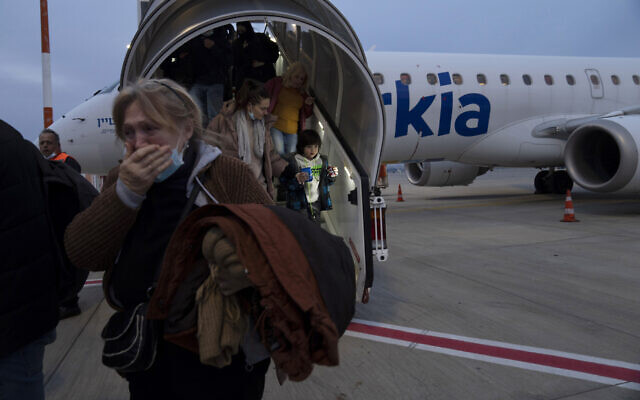
Illustrative: Ukrainians disembark from a special flight to Israel from Romania upon landing at Ben Gurion Airport, March 8, 2022 (AP Photo/Maya Alleruzzo)
Israeli authorities said that Sunday several thousand refugees from Ukraine have already arrived in the country, apparently already hitting the maximum number of refugees not of Jewish descent that the country was prepared to accept.
The government has seen internal debate over policy on Ukrainians seeking refuge — that is, those who do not automatically qualify for immigration to Israel under the Law of Return, which allows anyone who has a Jewish parent or grandparent to receive Israeli citizenship.
Interior Minister Ayelet Shaked said last week Israel would allow some 20,000 Ukrainians who were on tourist visas or in the country illegally before the Russian invasion to remain in the country, and would also grant visas to a further 5,000 non-Jewish refugees seeking to escape the war.
Those 5,000 visas would solely allow the refugees to remain in the country without fear of deportation.
It would not allow them to work legally, send their children to school or get access to Israel’s health care.
All Jewish Ukrainians are allowed into Israel and given citizenship under the Law of Return, and the government expects the fighting to prompt tens of thousands of Russian and Ukrainian Jews to move to Israel.
The Population, Immigration, and Border Authority said Sunday that 7,179 people have arrived from Ukraine since the start of Russia’s invasion on February 24, of whom 221 were refused entry.
In total, around 2,000 of the Ukrainians who have arrived have immigration rights, meaning that the cap on non-Jewish refugees has apparently been reached.
There was no immediate response from Israeli officials on the matter.
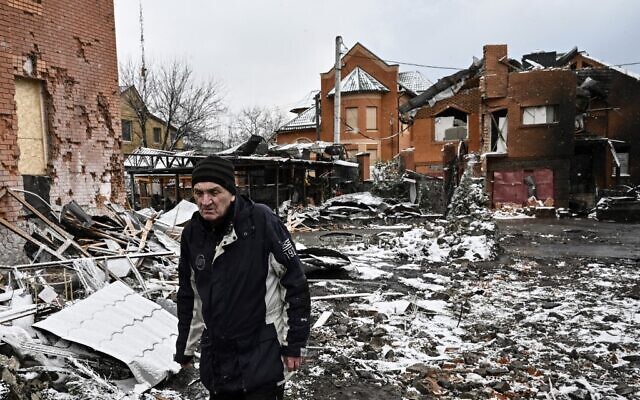
A man walks between houses destroyed during air strikes on the central Ukranian city of Bila Tserkva on March 8, 2022. (Aris Messinis / AFP)
Immigration lawyer Alex Zarnopolsky, who has been working to help the refugees, told The Times of Israel that the 5,000 limit on non-Jews entering has been reached.
“It was clear that by the time the quota would be applied, it would already be full,” he said. “In practice, we are not taking in refugees from Ukraine.”
Most of those who were able to enter the country have gone to stay with family or friends.
Zarnopolsky explained that many of the non-Jewish refugees have family members who are Israeli citizens or otherwise are in the country, but nonetheless do not qualify for citizenship under the Law of Return.
Two hotels are being used in Tel Aviv to house refugees while their paperwork is processed, the Dan Panorama Hotel and the Grand Beach Hotel. The refugees were moved to hotels after public outcry over the dismal conditions they were being held in at Ben Gurion Airport.
Zarnopolsky said there has been no update from the Interior Ministry and that it is unclear what the current situation is, or whether the country will let more people in.
He charged that “they are trying as much as possible to refuse people.”
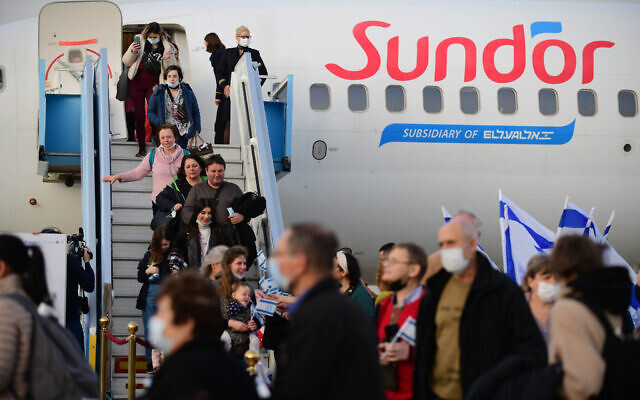
Jewish immigrants fleeing the war in Ukraine, arrive at Ben Gurion airport near Tel Aviv on March 6, 2022. (Tomer Neuberg/FLASH90)
Whereas Jewish refugees have been welcomed to Israel in what is seen as a fulfillment of an essential role of the Jewish state, Zarnopolsky said that arrivals who are not eligible for citizenship are not being given any social welfare rights, their children cannot enter the Israeli school system, and elderly refugees do not have health coverage.
But, most of those who have come to Israel have no intention of staying in the country, he asserted, and intend only to wait out the war and then return to their homeland.
Cabinet to review cap
Deputy Economy Minister Yair Golan, whose Meretz party opposes the cap, told the Kan public broadcaster on Sunday, “We never miss an opportunity to do nonsensical things.”
“All that is needed is a little courage and a little generosity,” he said. “Why do we have to be perceived in the world as miserly, racist, as not offering a hand?”
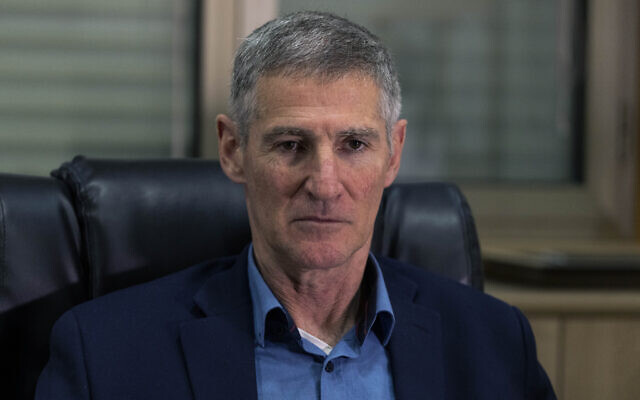
Deputy Economy and Industry Minister Yair Golan, a legislator with the dovish Meretz party, in his office at the Knesset, in Jerusalem, on January 17, 2022. (Tsafrir Abayov/AP)
Golan rejected the suggestion that Israel needs to reserve its resources for the expected waves of tens of thousands of new immigrants prompted by the fighting.
“We can open our gates to a few thousand refugees and in parallel absorb broad immigration,” he said.
Golan said the country is able to take in 30,000 refugees without needing to differentiate between those who are Jewish and those who aren’t.
Dozens of people protested outside Shaked’s home on Saturday night calling for more refugees to be allowed to enter Israel, and hundreds demonstrated in central Tel Aviv.
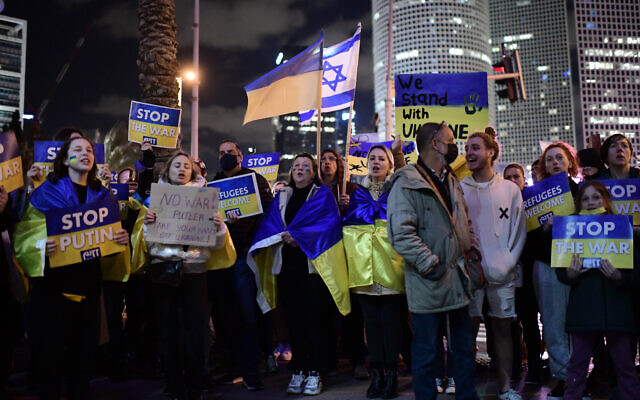
Demonstrators carry placards and flags during a protest in Tel Aviv against the Russian invasion of Ukraine, on March 12, 2022. (Tomer Neuberg/Flash90)
Israel’s policy toward non-Jewish Ukrainian refugees has sparked debate since Russia’s invasion began late last month, with critics inside and outside of the country slamming the policy as woefully insufficient.
During Monday’s upcoming cabinet meeting, left-wing members of the government are expected to push for raising the cap on the number of non-Jewish Ukrainian refugees allowed to stay in Israel.
The Meretz party said its ministers will demand that Israel “give refuge to all refugees.”
“No quotas, without differentiation of religion, race, or gender,” the party said. “This is our basic duty as Israelis and human beings.”
Diaspora Affairs Minister Nachman Shai of the Labor party will demand during the meeting that a ministerial committee be formed to decide on Israel’s refugee policy, Walla news reported.
“Israel doesn’t have a defined and clear immigration policy. The refugee crisis from Ukraine requires a government decision that is agreed upon by all the different elements of the government,” said Shai, who has campaigned on behalf of the refugees.
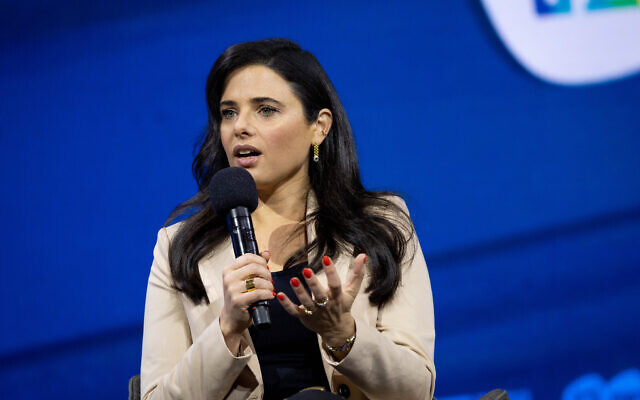
Interior Minister Ayelet Shaked speaks at a conference in Jerusalem on March 7, 2022. (Yonatan Sindel/Flash90)
Shaked said Saturday that Foreign Minister Yair Lapid, who leads the Yesh Atid party, was a “partner” in the decision to cap the number of non-Jewish Ukrainians allowed to stay in Israel.
In an interview with Channel 13 news, Shaked said determining immigration policy is under her “clear authority.”
Pressed further on Lapid’s role in the refugee cap announced Tuesday, Shaked said, “We built this proposal together.”
Ukraine’s embassy in Israel on Saturday said it backed a petition to the High Court of Justice against Israel’s limitations on Ukrainian refugees.
The appeal argues that the government’s cap on refugee entries violates international agreements between the nations as well as international conventions to which Israel is a party, and was imposed without proper authority.
Over 2.5 million Ukrainians have fled the war, with the majority going to neighboring Poland. Millions more are internally displaced.
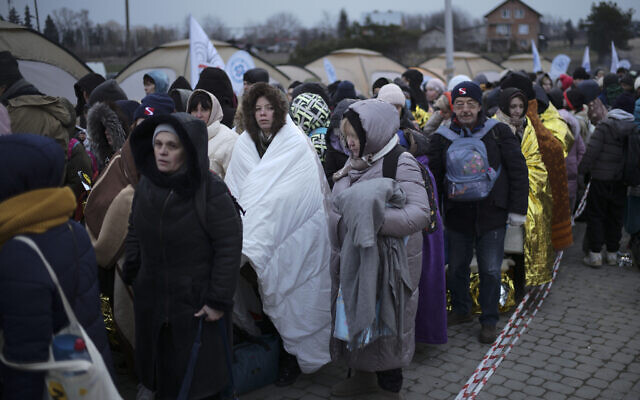
Refugees wait in a crowd for transportation after fleeing from the Ukraine and arriving at the border crossing in Medyka, Poland, March 7, 2022 (AP Photo/Markus Schreiber)
Ukraine has consistently pressed Israel for more support during the conflict.
Israel has provided humanitarian aid to Ukraine, including 100 tons of medical and cold-weather equipment flown out of Ben Gurion Airport last week. However, it has sought to walk a tightrope to maintain good relations with both Ukraine and Russia. Russia maintains a military presence in Syria and is negotiating Iran’s return to a nuclear deal.
Bennett has mediated between Ukraine and Russia, and on Saturday, Ukrainian President Volodymyr Zelensky proposed a summit in Jerusalem with Russian President Vladimir Putin.
At least 7 rented private jets are suspected of carrying wealthy Russian oligarchs to Israel in an effort to escape sanctions imposed on Moscow
March 8, 2022
At least seven rented private jets are suspected of carrying wealthy Russian oligarchs to Israel in an effort to escape sanctions imposed on Moscow.
According to the Times of Israel, the planes originate from a company in Turkey that provides jets for hire in Europe.
Tracking data showed the planes made trips to Moscow and St. Petersburg, then from those cities to Tel Aviv.
This comes after several Russian oligarchs have been sanctioned by the US, UK and EU, resulting in them being cut off from the US financial system, with their assets frozen and property blocked off.
Israel has not joined the imposition of sanctions but has said oligarchs cannot leave their planes or yatchs on its soil for more than 48 hours.
"We will not give oligarchs on the sanctions list their yachts and airplanes in Israel. We must not be seen as a country used to evading sanctions," an official told Ynet.
Despite the sanctions on Russia, the Bank of Israel has yet to issue instructions on how local banks should deal with Russian banks in general, and Russian oligarchs in particular, who hold Israeli bank accounts.
Channel 12 news on Friday reported that an inter-ministerial committee is set to give recommendations to the government this week regarding sanctions that Israel could impose against Russia.
It added that there is no legislation that would prevent oligarchs with Israeli citizenship from putting their money into bank accounts in Israel.
No comments:
Post a Comment